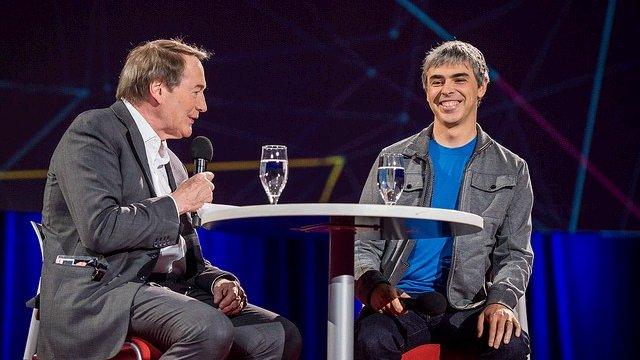TED 2015: Eighteen minutes to change the world
- Published
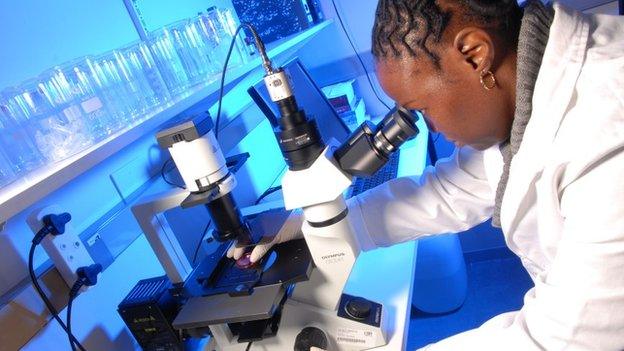
Dr Patience Mthunzi is attempting a novel way of delivering drugs - via laser
Patience Mthunzi is off to the TED conference in the Canadian city of Vancouver this week hoping, among other things, to raise money for a project that could lead to medicines being delivered via laser rather than pills.
As a laser physicist, she and her team at the Scientific and Industrial Research Centre in Pretoria, South Africa, are hoping that the novel way to deliver drugs could prove far more effective at targeting the cells in the body where viruses lurk.
Alongside her in Vancouver will be 20 other TED fellows - chosen by the conference organisers as young "game-changers", working on projects in a wide variety of disciplines, from policy analysis and biology to choreography, sculpture and astrophysics.
They include Tal Danino, a bioengineer who is genetically programming bacteria to target tumours; Sarah Sandman, who creates experiments that allow communities to share, for example, gifts of art; and Trang Tran, a social entrepreneur who is teaching Vietnamese farmers how to use biowaste to grow high-quality mushrooms.
They are all likely to receive a warm welcome at the conference, which is increasingly focusing its attention on solving some of the world's biggest problems.
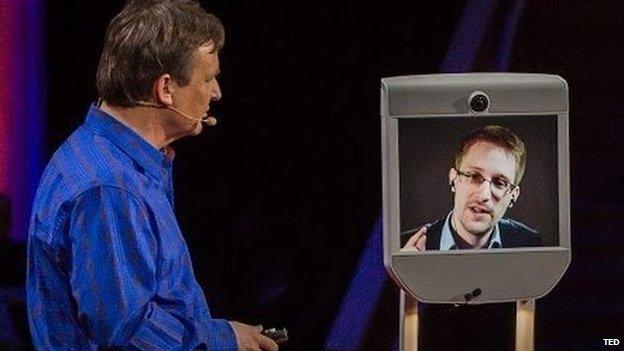
Last year Edward Snowden made a surprise appearance via video link at TED
As well as getting a series of free tickets to TED events, the fellows also are allocated a mentor and receive access to a private network of people who may help them get their projects to the next level.
For many of them, working on cutting-edge research, this often boils down to money.
"If I could get some funding it would make me very excited," said Dr Mthunzi.
She is looking for 5m to 10m rands (£273,000 to £550,000) annually to fund the project.
Delivering drugs via lasers is a very new area but Dr Mthunzi is convinced that it can be far more effective than current methods.
"Patients have to swallow pills and the concentration is lost in the digestive system, meaning they are less efficient. When you get to where the virus is lying dormant, they are even more diluted," she told the BBC.
The system has been tested on HIV-infected blood samples in the laboratory, and she hopes she and her team can develop equipment that can eventually be used in field hospitals in remote areas to effectively test for and treat the virus.
The system "may be able to completely eradicate the virus from the body", she told the BBC before the conference.
She will explain her project, and hopefully attract the attention of someone in the audience, on the first day of TED when all the fellows are invited to take to the stage for a five-minute speech.
Assorted billionaires
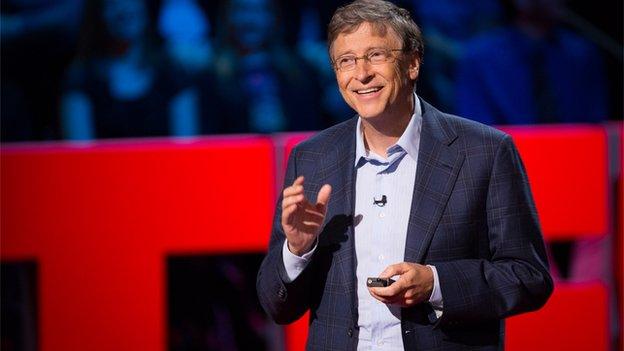
Bill Gates has become a regular at TED
Speakers at the rest of the TED conference famously get 18 minutes to deliver their carefully crafted and well-rehearsed speeches.
While other technology conferences seem to have lost some of their kudos in recent years, TED remains hugely popular.
This year at CES, the world's biggest gadget fair, there were murmurs of discontent that no-one was actually launching anything new. And at Mobile World Congress last month, there were moans that it was just a bunch of phones that all looked the same.
But TED remains uniquely colourful and distinct, even though tickets cost an eye-watering $8,500 (£5,700).
Such a high price tag means the audience is generally made up of rich movers and shakers - Silicon Valley investors, tech-firm executives and assorted billionaires.
Some come to TED to network but for many TED time is downtime. Those attending are told to turn off their phones, soak in the atmosphere and go home full of big ideas.
This can make life as a journalist covering the conference rather frustrating - already two of Google's executives have turned down interviews with the BBC, saying they would rather "enjoy" the conference.
Tech demos
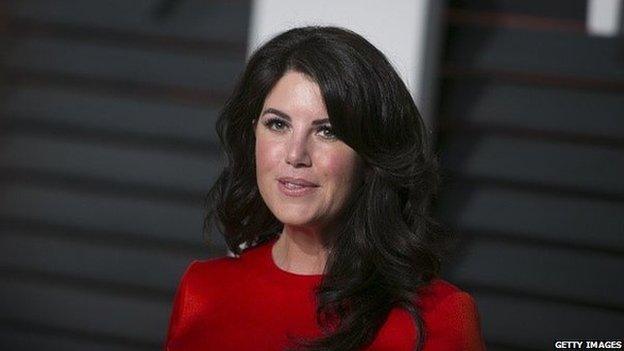
Monica Lewinsky is expected to talk about online bullying
The theme of this year's conference is Truth and Dare and it aims to answer some pretty big questions facing the modern world, including "Is technology no fun any more?", "Have we lost the battle against Big Brother?", and "Will robots destroy more jobs than they create?"
Speakers include Tony Fadell, the founder of Nest and newly in charge of the redevelopment of Google Glass, and Bill Gates, who will once again take the stage to talk about his philanthropic projects.
Then there are the more obscure speakers, such as Abe Davis, a computer scientist who has created an algorithm that samples the vibrations of ordinary objects, including a crisp bag, and turns them into intelligible audio tracks.
And there is always someone well known but unexpected. This year that honour will probably fall to Monica Lewinsky, who became famous during her time as an intern for Bill Clinton at the White House, who is due to talk about online bullying.
Hopefully there will be a technology demo or two - in the past the stage has shown off robot cockroaches and a dancer with an advanced prosthetic leg. Back at TED 2009, Pranav Mistry showed off a gesture interface, Sixth Sense, that allowed him to replicate what he did in the physical world digitally.
This year Rony Abovitiz, of Magic Leap, will be at the conference and is expected to show off the Google-backed augmented reality device.
'Circus performers'
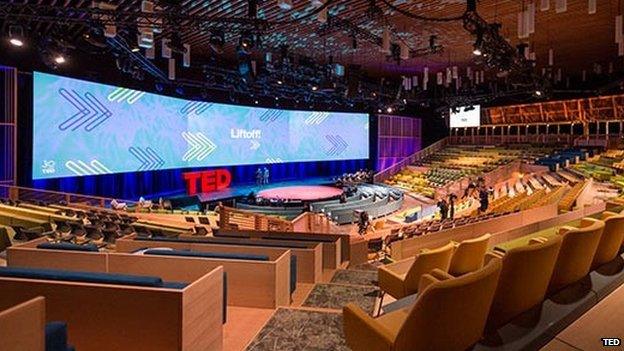
TED's new home in Vancouver features a purpose-built wooden auditorium
But technology is not always at the top of TED's agenda now.
Technology-based talks did not feature heavily in any of the top 20 most-watched TED talks.
Instead the most popular read like a motivational management course with titles such as "How to spot a liar", "Your elusive creative genius", 'The power of vulnerability", and "How great leaders inspire action".
The conference is not without its critics. Some accuse the organisers of being too controlling over what can and cannot go into speeches; others feel it has lost sight of its original goals; and author Nassim Taleb famously called TED a "monstrosity that turns scientists and thinkers into low-level entertainers, like circus performers".
But it is a circus that shows no sign yet of packing up its tent. Its new home in Vancouver features a purpose-built wooden stage to accommodate the swelling ranks of the audience.
The fellows remain one of the biggest draws and for them TED represents a great opportunity for global exposure.
Dr Mthunzi is just looking forward to being a part of it. If she also gets some funding along the way, that will be a nice bonus.
- Published19 March 2014
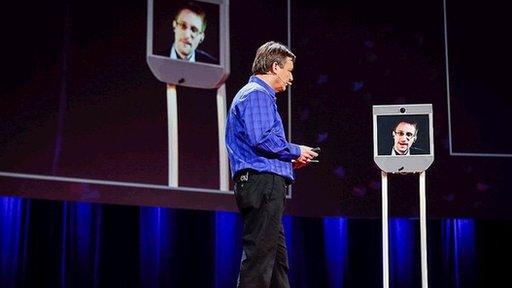
- Published20 March 2014
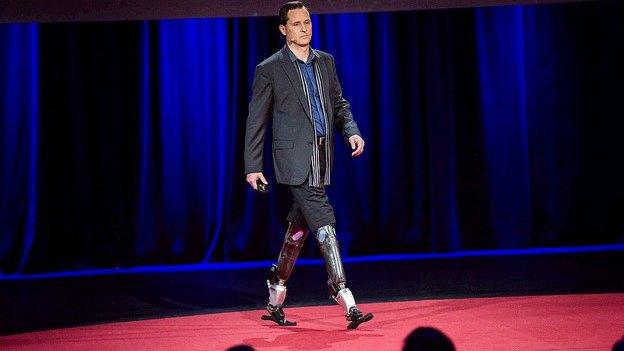
- Published20 March 2014
